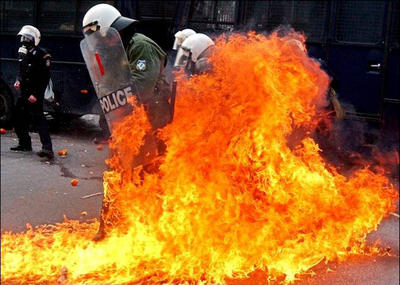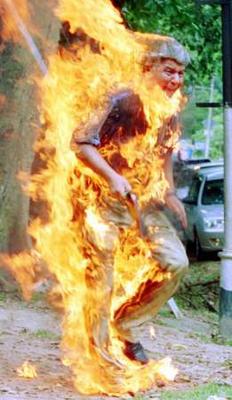 The City of New Orleans is fast slipping past the point of redeemability and into total chaos. Thousands of people without food, water, shelter, medicine or hope. Dead bodies lying out in the streets, floating in the floodwater, and in the Superdome with the refugees. Gangs of armed looters are terrorizing the victims and shooting at rescue workers.
The City of New Orleans is fast slipping past the point of redeemability and into total chaos. Thousands of people without food, water, shelter, medicine or hope. Dead bodies lying out in the streets, floating in the floodwater, and in the Superdome with the refugees. Gangs of armed looters are terrorizing the victims and shooting at rescue workers.The looters are stealing televisions and shoes, yet they walk right past the bleach and coffee filters. One gallon of bleach will treat two thousand gallons of dirty water and the filters will take out most of the particulate matter. Four drops of bleach per quart of fouled water. But they sit, thirsty on their TVs with their new sneakers, and complain that no one is helping them.
The National Guard has finally arrived, but so much damage has already been done. So, if this administration can’t protect its own people and respond in a timely manner to a very predictable hurricane, why do people think the government can respond to the next terrorist attack? The Bush administration denies that global warming is occurring, sends most of our troops on a pointless adventure in Iraq, and has run up an astronomical budgetary deficit, having inherited a budget surplus. Bush has publicly admitted that the relief effort is "not acceptable," but he does not have to look past the mirror to find who’s responsible.
Bush can’t help you, and the government can’t help you. There’s only one thing you can do (two if you have bleach and coffee filters) – VOTE THE BASTARDS OUT OF OFFICE! This election, right now, make your dissatisfaction known. Support Cindy Sheehan. Get involved in grass-roots activism. Don’t make me run for president myself (I’ll do it!).
But while chemical plants are on fire, and a pervasive petroleum sheen is seen on the water from a mix that likely includes dry-cleaning solvents, household cleaners, and gasoline, experts have expressed some relief that chemical facilities and refineries near the city remained intact. While some plants were flooded once the levees broke, they were apparently spared the force of the storm surge, which might have cracked storage tanks and released tons of chemicals into the floodwaters.
 It's not the worst scenario that could have been envisioned. However, Federal officials have declared a public health emergency, fearing that viruses and bacteria from sewage in the floodwaters could cause a major outbreak of intestinal illnesses.
It's not the worst scenario that could have been envisioned. However, Federal officials have declared a public health emergency, fearing that viruses and bacteria from sewage in the floodwaters could cause a major outbreak of intestinal illnesses.But far from being solely a "natural" disaster, Hurricane Katrina's impact was compounded by human alterations of the Gulf Coast ecology. The landscape of South Louisiana depends on floods: it is made of loose Mississippi River silt, and the ground subsides as this silt consolidates. Only regular floods of muddy water can replenish the sediment and keep the landscape above water. Complex levee and canal systems built to protect New Orleans from being flooded by the Mississippi River, and to improve the river as a shipping channel, channel the river's nourishing sediment to the end of the delta and out into the deep water of the Gulf of Mexico. Although early travelers realized the irrationality of building a port on shifting mud in an area regularly ravaged by storms and disease, the opportunities to make money overrode all objections.
The flood control projects have also prevented river silt from replenishing the region's marshlands and river delta for centuries. More than a million acres -- 1,900 square miles -- of Louisiana's coastal wetlands have been lost to development and flood controls since the 1930s, along with barrier islands and stands of coastal forest. Louisiana continues to lose about 25 square miles of coastal area each year. These natural barriers could have absorbed some energy and water from Katrina's storm surge and mitigated the hurricane's force; studies estimate that storm surges rise by about a foot for each square mile of wetlands lost.
So is it worthwhile to rebuild a city that’s likely to only flood again? At the cost of the wetlands and barrier islands that would otherwise protect the rest of the state? I don’t have the answer, but it’s an important question to ask. However, I fear we’re not going to hear any real debate on it.

2 comments:
With so much hysteria and angry fingerpointing filling the blogosphere, its refreshing to hear a scientifically informed view of what is going on [I've heard no one else remark that there are resources on the ground for residents to purify water...just that the water is all foul] and what will go on [the hydrology and soil science of the region are no longer just interesting to scientists , one would hope]. Thanks.
scientists and engineers called this one long ago, the bush league did nothing and took away emergency response capabilities to boot
Threat to run for president noted. We could sure use a Buddhist in that office!
Post a Comment